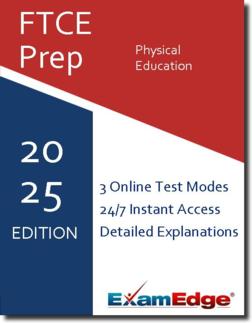FTCE Physical Education (063) Practice Tests & Test Prep by Exam Edge - Topics
Based on 37 Reviews
- Real Exam Simulation: Timed questions and matching content build comfort for your FTCE Physical Education test day.
- Instant, 24/7 Access: Web-based FTCE Physical Education K-12 practice exams with no software needed.
- Clear Explanations: Step-by-step answers and explanations for your FTCE exam to strengthen understanding.
- Boosted Confidence: Reduces anxiety and improves test-taking skills to ace your FTCE Physical Education K-12 (063).

Understanding the exact breakdown of the FTCE Physical Education K-12 test will help you know what to expect and how to most effectively prepare. The FTCE Physical Education K-12 has 100 multiple-choice questions The exam will be broken down into the sections below:
| FTCE Physical Education K-12 Exam Blueprint | ||
|---|---|---|
| Domain Name | % | Number of Questions |
| Knowledge of the history and philosophy of the physical education profession | 3% | 3 |
| Knowledge of standards-based physical education curriculum development | 10% | 10 |
| Knowledge of developmentally appropriate physical education instructional strategies |
13% | 13 |
| Knowledge of human growth and development and motor learning as they relate to physical education |
8% | 8 |
| Knowledge of developmentally appropriate movement skills and concepts related to physical education |
12% | 12 |
| Knowledge of lifetime health, wellness, and physical fitness | 12% | 12 |
| Knowledge of cognitive, social, and emotional development through physical education and physical activity |
7% | 7 |
| Knowledge of various types of assessment strategies that can be used to determine student levels and needs in physical education |
10% | 10 |
| Knowledge of strategies that promote an effective learning environment | 7% | 7 |
| Knowledge of laws, legislation, and liabilities that pertain to physical education | 4% | 4 |
| Knowledge of appropriate safety considerations, rules, strategies, and terminology related to physical education and a variety of physical activities |
5% | 5 |
| Knowledge of professional ethics, advocacy, and development | 4% | 4 |
| Knowledge of the appropriate use of technology as related to physical education | 5% | 5 |


